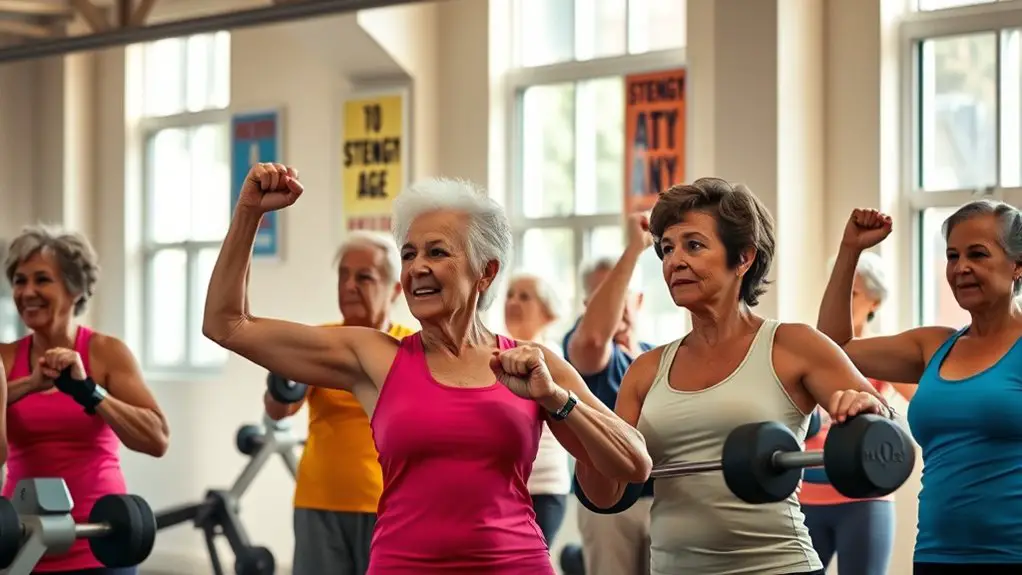How to Prevent Muscle Loss as You Age

To prevent muscle loss as you age, focus on strength training, eat a balanced diet with quality proteins, and stay active. Incorporate bodyweight exercises and resistance training into your routine at least 2-3 times a week. Make certain you consume protein regularly throughout the day to support muscle health. Staying engaged in activities like walking, gardening, or dancing can also help. There’s more to explore on how you can maintain your strength and energy as you age.
Understanding Sarcopenia and Its Impact

As you age, it’s crucial to understand sarcopenia and its impact on your body. Sarcopenia, the gradual loss of muscle mass and strength, can considerably affect your overall health and mobility. Several sarcopenia causes, including hormonal changes, inactivity, and inadequate protein intake, contribute to muscle aging. This condition often starts in your 30s and accelerates as you reach your 50s and beyond.
Recognizing the signs early can empower you to take proactive steps. You might notice decreased strength or endurance, making daily activities more challenging. This isn’t just about aesthetics; maintaining muscle is key for balance, coordination, and preventing falls. By staying informed and understanding how sarcopenia develops, you can prioritize your well-being. Regular physical activity, particularly resistance training, can counteract these effects. Taking these measures not only helps preserve your muscle but also enhances your overall quality of life as you age.
The Importance of Nutrition for Muscle Health
Muscle health is closely tied to nutrition, especially as you work to counteract sarcopenia. Focusing on quality protein sources and nutrient timing can make a significant difference in preserving muscle mass.
Here’s a quick guide to help you choose the right foods:
| Meal Time | Protein Sources | Benefits |
|---|---|---|
| Breakfast | Eggs, Greek yogurt | Kickstarts muscle repair |
| Lunch | Chicken, Quinoa | Supports muscle maintenance |
| Snack | Cottage cheese, Nuts | Provides sustained energy |
| Dinner | Fish, Lentils | Aids recovery overnight |
Incorporating these protein sources throughout your day guarantees you’re fueling your muscles appropriately. Aim to consume protein at regular intervals, ideally every few hours, to maximize the benefits of nutrient timing. This approach not only supports muscle health but also enhances your overall well-being.
Effective Strength Training Techniques

To maintain muscle mass as you age, incorporating effective strength training techniques is essential. Start with bodyweight exercises, like squats and push-ups, which are safe and can be done anywhere. These exercises help improve strength without the need for heavy weights.
Next, consider resistance training using bands or light weights. This form of training builds muscle and enhances bone density, both vital as you age. Make sure to focus on form to reduce the risk of injury; it’s better to do fewer repetitions correctly than to push for more and compromise your safety. Additionally, including isolation exercises for biceps can further enhance your strength training routine.
Aim for at least two to three sessions per week, allowing for rest days in between to help your muscles recover. Gradually increase the intensity as you become more comfortable. Always consult with a healthcare professional or a trainer if you’re unsure where to start or how to modify exercises for your personal needs.
Staying Active: Beyond the Gym
While strength training is essential, staying active outside the gym is equally important for maintaining muscle mass and overall health as you age. Engaging in activities like walking groups can help you socialize while keeping your body moving. Consider joining recreational sports, which not only provide exercise but also foster a sense of community. Gardening activities are another great way to stay active; they involve various movements that can strengthen your muscles and improve flexibility. Dance classes offer a fun way to work on coordination and balance, all while enjoying music. Don’t forget about home workouts—simple exercises can be done in front of your TV. Finally, pursuing active hobbies, whether it’s hiking or biking, guarantees you’re consistently moving. Skipping rope can serve as an excellent full-body workout that further supports muscle preservation and enhances cardiovascular health. By combining these activities, you can create a balanced lifestyle that supports muscle preservation and enhances your overall well-being.
Lifestyle Changes to Support Muscle Preservation

As you age, making thoughtful lifestyle changes can greatly support muscle preservation. Simple lifestyle modifications and daily habits can make a significant difference. Here are some essential changes to take into account:
| Lifestyle Modifications | Daily Habits | Benefits |
|---|---|---|
| Balanced Diet | Regular Hydration | Supports muscle recovery |
| Strength Training | Adequate Sleep | Enhances muscle growth |
| Stress Management | Consistent Routine | Reduces muscle breakdown |
| Social Engagement | Active Hobbies | Encourages physical activity |
Incorporating these modifications into your routine can help maintain your muscle strength and overall health. Aim for a balanced diet rich in protein, stay hydrated, and prioritize sleep. Regular strength training and managing stress are vital, too. Additionally, engaging in youth gym programs can foster a supportive community that encourages physical activity. Remember, it’s never too late to adopt these daily habits for better muscle preservation as you age.
Frequently Asked Questions
Can Supplements Help Prevent Muscle Loss as We Age?
Yes, supplements can play a role in preventing muscle loss. Protein supplementation’s been shown to support muscle maintenance, especially as you age. Additionally, creatine benefits your muscles by enhancing strength and exercise performance. However, it’s crucial to consult a healthcare professional before starting any supplement regimen. They can help guarantee it’s safe for you and fits your individual needs. Remember, supplements should complement a balanced diet and regular exercise for the best results.
How Does Hydration Affect Muscle Health in Older Adults?
Imagine a well-tended garden thriving with vibrant plants. Just like that garden, your muscles need proper hydration to flourish. Staying hydrated supports muscle recovery and helps maintain strength. Implementing hydration strategies, like drinking water regularly and consuming hydrating foods, can keep your muscles functioning well. As you age, it’s essential to prioritize hydration for overall health. So, remember, a well-hydrated body is key to keeping your muscles happy and healthy!
Is There a Specific Age to Start Strength Training?
There isn’t a specific age to start strength training; it really depends on individual circumstances. However, age milestones like your 30s or 40s can be great times to begin. Starting early helps build a solid foundation and can enhance your overall health. Just make sure you consult with a healthcare professional before starting any program, especially if you have existing health concerns. Safety should always be your priority when incorporating strength training into your routine.
What Role Does Sleep Play in Muscle Preservation?
Did you know that poor sleep quality can reduce muscle recovery by up to 40%? When you prioritize good sleep, you’re not just resting; you’re enhancing your body’s ability to repair and grow muscle. Recovery’s important, especially after workouts, as it helps your muscles rebuild stronger. So, aim for 7-9 hours of quality sleep each night. Your muscles will thank you, and you’ll feel safer and more energized for your next training session!
Are There Genetic Factors Influencing Muscle Loss?
Yes, there are genetic factors that can influence muscle loss. You might have a genetic predisposition that makes you more susceptible to muscle atrophy as you age. While you can’t change your genetics, understanding them can help you take proactive steps to mitigate muscle loss. Focusing on nutrition, regular exercise, and adequate sleep can counteract some of these genetic effects, ensuring you maintain your strength and overall health as you grow older.





